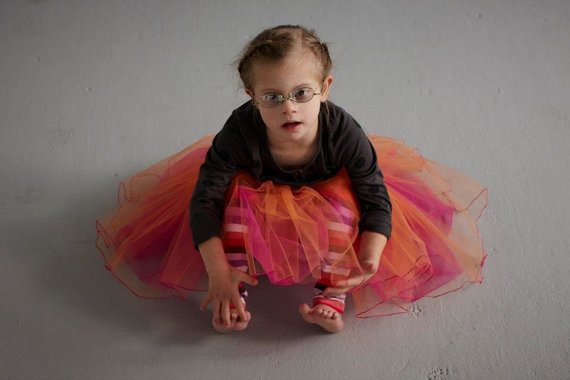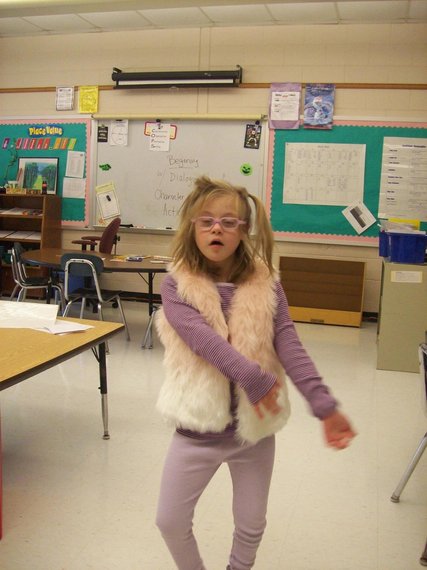The first week after my daughter Johanna was born, I had a lot of doctors drifting in and out of hospital rooms direly warning me about all the things she might never be able to do. Drink from a bottle. Eat solid food. Become toilet trained. Learn to read. Be educated amongst her typical peers. Eight years later, Jo Jo, who has Down Syndrome, has proved them all wrong.
Every day she gets on a little yellow bus and goes to our neighborhood school, where she has not only learned to read, but where she has also rapidly become the most popular little girl in her second grade class. She participates in yoga and ballet, performs in the school play, and has a whirlwind social life, despite not being very verbal or even being at the same cognitive level of her peers. She's defied the medical experts' gloomy predictions: Jo Jo's life has been filled with what she can do, rather than what she cannot.
Which is why I was so dismayed when I saw the recent campaign that advertising powerhouse Saatchi & Saatchi had pulled together for World Down Syndrome Day. The short film features scenes from the life of a beautiful young woman (played by model/actress Olivia Wilde): camping with her family, strolling on a beach, cuddling with a boyfriend, dancing at a bar, all while an invisible narrator says, "I see myself as an ordinary person with an important, meaningful, beautiful life."
The camera then shifts to another woman -- Anna Rose, a 19-year-old woman with Down Syndrome -- who asks, "How do you see me?"
More From The Stir: The Average Age of First-Time Moms Around the Word (PHOTOS)
It's a metaphor, of course -- one meant to convey how people with Down Syndrome see themselves, the idea being that they view themselves as vibrant, vital, competent people, while the rest of the world sees someone with an intellectual disability who's capable of very little.
But as the mother of an 8-year-old little girl with Down Syndrome, I felt like my first reaction was to cringe. Why? Because as well-intentioned as the video was, the comparison of any young woman -- with or without Down Syndrome -- to one who ostensibly upholds all the conventional standards of beauty is troubling.
I don't want my daughter to look into the mirror and think she sees Olivia Wilde. I want her to look into the mirror and see herself, Jo Jo, as she truly is: her wide almond-shaped hazel eyes; her cute-as-a-button-but-slightly-flattened nose; her small, but perfectly proportioned, rosebud lips that are almost always pursed into a grin. I want her to look in a mirror and think she's beautiful, not because she looks like a supermodel, or because she looks like someone with Down Syndrome, but because she's herself, Jo Jo, and that's an amazing thing to be.
"I get what they were trying to do with the ad -- they were trying to convey that we're all the same person inside," says Rachel Adams, PhD, director of the Future of Disability Studies at Columbia University who also has a son, Henry, with Down Syndrome. "But is the message that we all have to look like Olivia Wilde in order to be valued by others?"
The creators of the clip claim that the short shows how people with Down Syndrome can be "disadvantaged when people pre-judge them based on their condition." That's a very real truth, and in fact research shows that people view children with Down Syndrome in a much more negative light than they do their typical peers.
But in my experience, the most effective way I've found to blast unfavorable stereotypes about my daughter is to simply encourage people to be around her; the more time they spend with Jo Jo, the more they realize how capable she is, and how she's so much more than her extra chromosome.
I can't help but wonder how much more powerful the video would be if it simply had Anna Rose doing all the things she narrates about. I can't help but feel that her experience has simply been erased, that instead of showcasing the accomplishments of individuals with Down Syndrome, it's simply showcasing Olivia Wilde and her apparent benevolence. Every single news story I've seen features Olivia Wilde's name in the headline, while actress Anna Rose is mentioned briefly, if at all.
It saddens me, especially since every day I'm in awe of what Jo Jo can accomplish. Over the last year alone, I've seen her master jump roping, dance in the Nutcracker, swim across a pool on her own, find her BFF, and have her first sleepover -- all things that when she was born I assumed she could never do. She has a coterie of girlfriends, and I'm always amazed not just by their unconditional acceptance of her, but also by their own acceptance of themselves and that they can do anything they set their minds to when they grow up, whether it's become a member of Congress or join a rock band. And as far as they're concerned, Jo Jo will be right there along with them.
To me, that's what we should be celebrating: the notion that our children are real, beautiful, perfect the way they are, and accepted by their peers despite their differences. The message shouldn't be that we're all the same inside, that within each woman with Down Syndrome is an Olivia Wilde just waiting to be let out and recognized. It should be that we're all different, and those differences should be embraced, whether it's being a different race or different religion or even having a different number of chromosomes. It seems so simple, yet sadly it seems to elude so many people.
But the fact that so many people who have been exposed to my daughter seem to quickly recognize that and champion her as if she were one of their own -- even if she doesn't fit the cookie-cutter version of beauty that Olivia Wilde does -- gives me hope, both for Jo Jo and for other individuals with Down Syndrome.
Images via Hallie Levine

